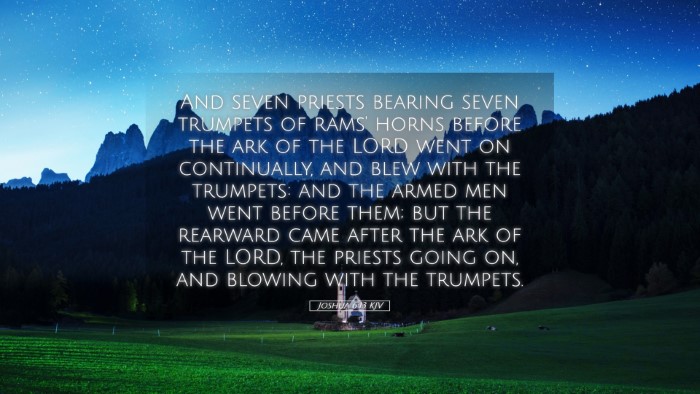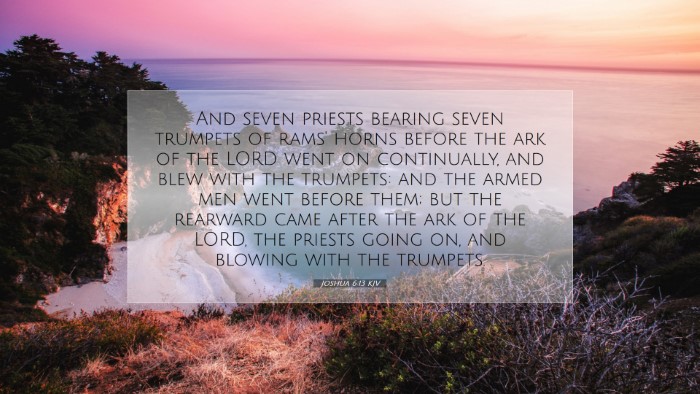Commentary on Joshua 6:13
Verse Overview: Joshua 6:13 states, “And the seven priests bearing the seven trumpets of rams' horns before the ark of the LORD went on continually, and blew with the trumpets: and the armed men went before them; but the rereward came after the ark of the LORD, the priests going on, and blowing with the trumpets.” This verse encapsulates a pivotal moment in Israel's history during the conquest of Jericho, emphasizing the obedience to God’s command and the significance of the Ark of the Covenant.
Historical Context
This chapter describes the miraculous siege of Jericho, which was the first major city the Israelites encountered upon entering Canaan. The context of the conquest is steeped in the fulfillment of God's promise to His people and showcases how Israel was to rely on divine power rather than military might.
The Significance of the Ark of the Covenant
The Ark of the Covenant, which represents God's presence among His people, takes a central role in this passage. It serves as a powerful reminder of God's faithfulness. The priests bearing the Ark signify the mediating role of the priesthood in approaching God.
Insights from Matthew Henry
Matthew Henry emphasizes that the procession of the priests and the Ark illustrates the order and holiness maintained during the act of obedience. He notes that by following God’s command to march around Jericho while carrying the Ark, Israel demonstrated faith in God’s promise, believing that victory would come through divine intervention rather than violence.
Insights from Albert Barnes
Albert Barnes highlights the symbolic act of the trumpets being blown. He states that the trumpets served as a call to worship and a declaration of God’s sovereignty over the land. The rhythm of the trumpets amidst the army was a form of spiritual warfare, signifying that the battle belonged to the Lord. Barnes notes how the priests’ actions were integral, as they led the people in worship, underscoring the importance of reverence in Israel's military strategy.
Insights from Adam Clarke
Adam Clarke reflects on the strategic placement of the armed men and the priests with the Ark as indicative of the spiritual leadership in the community. He interprets the rereward, or rear guard, as a protection mechanism, showing that God not only leads His people but also cares for their safety during the engagement with Jericho. Clarke suggests that this verse shows how spiritual dedication lays the groundwork for physical victory.
Spiritual Applications
- The Role of Faith: This verse calls to mind the necessity of faith in the believer’s life. Just as Israel trusted in God’s plan amidst seemingly insurmountable odds, believers today are encouraged to have confidence in divine promises.
- Worship and Warfare: The act of worship being integral to battle strategy serves as a model for contemporary spirituality. The engagement in prayer and worship as a means of spiritual warfare signifies reliance on God over personal strength.
- Leadership and Responsibility: The priests leading the charge emphasize the critical role leaders play in guiding their communities. Pastors and spiritual leaders are reminded of their duty not only to teach but also to model faithfulness and trust in God’s guidance.
Conclusion
Joshua 6:13 stands as a profound testimony to the power of obedience to God’s directive, showcasing how Israel's faith resulted in the miraculous fall of Jericho. The combined insights from Matthew Henry, Albert Barnes, and Adam Clarke offer a multidimensional understanding of the text, emphasizing the intertwining nature of faith, worship, and God’s protective presence in the life of His people. As pastors, students, theologians, and scholars reflect on this passage, its relevance continues to resonate in the fabric of faith practice today.


